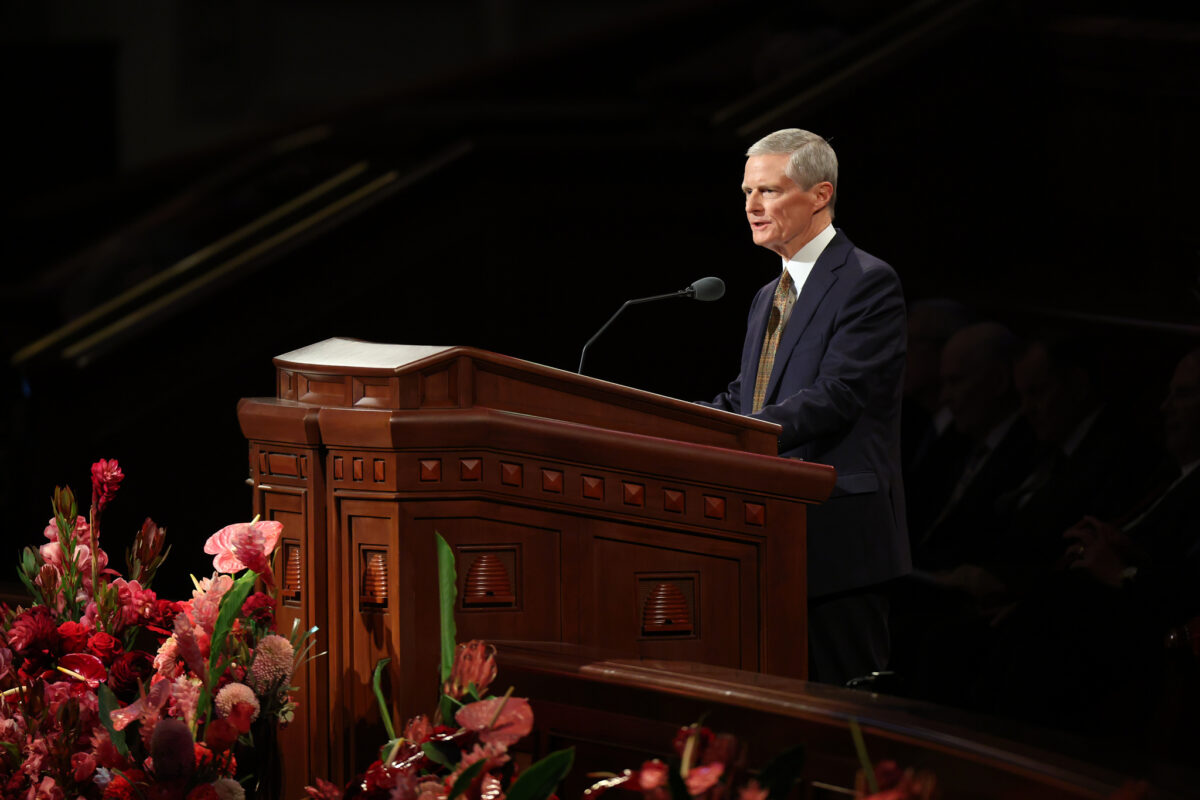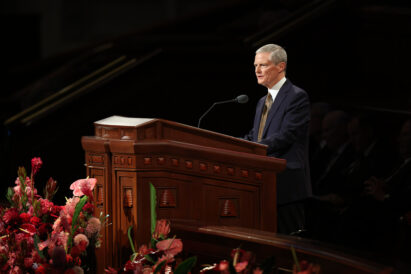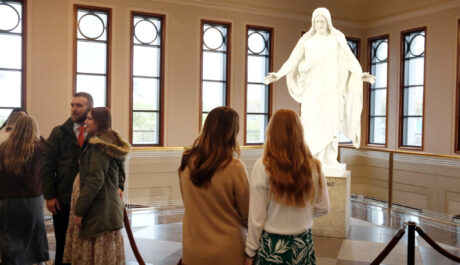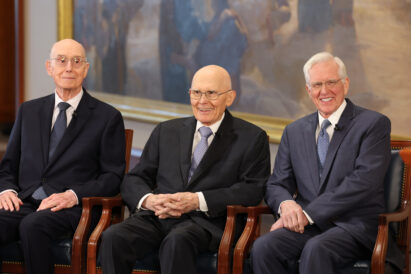Conference Counsel: At judgment bar, we will judge ourselves
- Elder David A. Bednar of the Quorum of the Twelve Apostles speaks during the Sunday afternoon session of general conference at the Conference Center in Salt Lake City on Oct. 5, 2025.
- Ryan Comer

Photo supplied, Intellectual Reserve
Elder David A. Bednar of the Quorum of the Twelve Apostles speaks during the Sunday afternoon session of general conference at the Conference Center in Salt Lake City on Oct. 5, 2025.
The new president of The Church of Jesus Christ of Latter-day Saints, Dallin H. Oaks, shared a talk during the October 1998 general conference where he talked about an experience he had doing yard work.
“A few weeks ago, I used a chain saw to cut down a tree in my backyard,” he said. “It was a dirty job, and when I was done I was splattered with a filthy mixture of sawdust and oil. In that condition I did not want anyone to see me. I just wanted to be cleansed in water so I would again feel comfortable in the presence of other people.”
I think that is probably a highly relatable experience that many can understand. Nobody wants to be filthy in the presence of other people. Certainly, nobody would want to go somewhere in such condition.
In this situation, the filthy person isn’t worried about being rejected by someone else, or from some location. They are, in effect, rejecting themselves, because they know their appearance simply doesn’t measure up. They aren’t beating down doors or trying to force their way into the presence of others despite their appearance. Such an idea would simply be unthinkable.
Over the years, it seems like I’ve heard an increasing number of leaders within The Church of Jesus Christ of Latter-day Saints speak on this concept of us essentially judging ourselves in the context of our eternal dwelling place.

Ryan Comer, Standard-Examiner
Ryan Comer
Bradley R. Wilcox said:
“But the older I get, and the more I understand this wonderful plan of redemption, the more I realize that in the final judgment it will not be the unrepentant sinner begging Jesus, ‘Let me stay.’ No, he will probably be saying, ‘Get me out of here!’ Knowing Christ’s character, I believe that if anyone is going to be begging on that occasion, it would probably be Jesus begging the unrepentant sinner, ‘Please, choose to stay. Please, use my Atonement–not just to be cleansed but to be changed so that you want to stay.’
“The miracle of the Atonement is not just that we can go home but that–miraculously–we can feel at home there.”
In October 2023, President Oaks said:
“We know from modern revelation that ‘all kingdoms have a law given’ and that the kingdom of glory we receive in the Final Judgment is determined by the laws we choose to follow in our mortal journey. Under that loving plan, there are multiple kingdoms–many mansions–so that all of God’s children will inherit a kingdom of glory whose laws they can comfortably ‘abide.'”
Also in October 2023, President Russell M. Nelson said:
“… if we unwisely choose to live telestial laws now, we are choosing to be resurrected with a telestial body. We are choosing not to live with our families forever.
“So, my dear brothers and sisters, how and where and with whom do you want to live forever? You get to choose.”
Advancing this concept of our agency and us choosing where we ultimately live was Elder David A. Bednar of The Quorum of the Twelve Apostles during the general conference of the church earlier this month.
Elder Bednar’s address, published on the church’s website, revolved around the final passage in the Book of Mormon – Moroni 10:34.
“I soon go to rest in the paradise of God, until my spirit and body shall again reunite, and I am brought forth triumphant through the air, to meet you before the pleasing bar of the great Jehovah, the Eternal Judge of both quick and dead,” Elder Bednar quoted Moroni as saying.
One word in particular stood out to Elder Bednar: pleasing.
“I am intrigued by Moroni’s use of the word ‘pleasing’ to describe the Final Judgment,” Elder Bednar said. “Other Book of Mormon prophets likewise describe the Judgment as a ‘glorious day’ and one that we should ‘look forward [to] with an eye of faith.’ Yet often when we anticipate Judgment Day, other prophetic descriptions come to mind, such as ‘shame and awful guilt,’ ‘dread and fear,’ and ‘endless misery.’
“I believe this stark contrast in language indicates that the doctrine of Christ enabled Moroni and other prophets to anticipate that great day with eager and hopeful anticipation instead of the fear they warned of for those not spiritually prepared.”
Throughout his talk, Elder Bednar discussed “Heavenly Father’s plan of happiness and mercy,” “the Savior’s atoning role in the Father’s plan” and “how we will ‘be accountable for [our] sins in the day of judgment.'”
The goal of his remarks, as I took it, was to help us to understand how we can ensure that the day of judgment is pleasing for us, which means that we will want to be in the presence of Heavenly Father and Jesus Christ, and we will know that we belong there.
“If we have exercised faith in Jesus Christ, made and kept covenants with God, and repented of our sins, the judgment bar will be pleasing,” Elder Bednar said in the subhead of his talk.
Heavenly Father’s plan and ‘moral agency’
To start, Elder Bednar discussed the plan of salvation, otherwise known as the plan of happiness.
“The overarching purposes of the Father’s plan are to provide His spirit children with opportunities to receive a physical body, learn ‘good from evil’ through mortal experience, grow spiritually, and progress eternally,” he said.
“What the Doctrine and Covenants refers to as ‘moral agency’ is central in God’s plan to bring to pass the immortality and eternal life of His sons and daughters. This essential principle also is described in the scriptures as agency and the freedom to choose and to act.”
Elder Bednar said the term “moral agency” is “instructive” and proceeded to elaborate on it.
“Synonyms for the word ‘moral’ include ‘good,’ ‘honest,’ and ‘virtuous,'” he said. “Synonyms for the word ‘agency’ include ‘action,’ ‘activity,’ and ‘work.’ Hence, ‘moral agency’ can be understood as the ability and privilege to choose and act for ourselves in ways that are good, honest, virtuous, and true.
“God’s creations include both ‘things to act and things to be acted upon.’ And moral agency is the divinely designed ‘power of independent action’ that empowers us as God’s children to become agents to act and not simply objects to be acted upon.
“The earth was created as a place whereon Heavenly Father’s children could be proved to see if they would ‘do all things whatsoever the Lord their God shall command them.’ A primary purpose of the Creation and of our mortal existence is to provide us the opportunity to act and become what the Lord invites us to become.”
What exactly are we supposed to become?
Continued Elder Bednar:
“The Lord instructed Enoch:
“‘Behold these thy brethren; they are the workmanship of mine own hands, and I gave unto them their knowledge, in the day I created them; and in the Garden of Eden, gave I unto man his agency;
“‘And unto thy brethren have I said, and also given commandment, that they should love one another, and that they should choose me, their Father.’
“The fundamental purposes for the exercise of agency are to love one another and to choose God. And these two purposes align precisely with the first and second great commandments to love God with all our heart, soul, and mind and to love our neighbor as ourselves.”
The implications of understanding what “moral agency” really is and what God has commanded us to become are important to understand clearly. We don’t have choices just to have choices. We have choices so that we can make good choices, which include loving God and loving one another. God wants us to have choices so that we can choose those things.
“Consider that we are commanded — not merely admonished or counseled but commanded — to use our agency to love one another and choose God,” Elder Bednar said. “May I suggest that in the scriptures, the modifying word ‘moral’ is not merely an adjective but perhaps also a divine directive about how our agency should be used.
“A familiar hymn is titled ‘Choose the Right’ for a reason. We have not been blessed with moral agency to do whatever we want whenever we will. Rather, according to the Father’s plan, we have received moral agency to seek after and act in accordance with eternal truth. As ‘agents unto [ourselves],’ we should engage anxiously in good causes, ‘do many things of [our] own free will, and bring to pass much righteousness.'”
Concluding this part of his message, Elder Bednar said:
“The eternal importance of moral agency is highlighted in the scriptural account of the premortal council. Lucifer rebelled against the Father’s plan for His children and sought to destroy the power of independent action. Significantly, the devil’s defiance was focused directly on the principle of moral agency.
“God explained, ‘Wherefore, because … Satan rebelled against me, and sought to destroy the agency of man, … I caused that he should be cast down.’
“The adversary’s selfish scheme was to strip away from God’s children the capacity to become ‘agents unto themselves’ who could act in righteousness. His intent was to consign Heavenly Father’s children to be objects that could only be acted upon.”
President Oaks on becoming
Quoting President Oaks, Elder Bednar said:
“‘Many Bible and modern scriptures speak of a final judgment at which all persons will be rewarded according to their deeds or works or the desires of their hearts. But other scriptures enlarge upon this by referring to our being judged by the condition we have achieved.
“‘The prophet Nephi describes the Final Judgment in terms of what we have become: ‘And if their works have been filthiness they must needs be filthy; and if they be filthy it must needs be that they cannot dwell in the kingdom of God’ [1 Nephi 15:33; emphasis added]. Moroni declares, ‘He that is filthy shall be filthy still; and he that is righteous shall be righteous still’ [Mormon 9:14; emphasis added].’
“President Oaks continued: ‘From such teachings we conclude that the Final Judgment is not just an evaluation of a sum total of good and evil acts–what we have done. It is an acknowledgment of the final effect of our acts and thoughts–what we have become.'”
The importance of the Atonement of Jesus Christ
Ultimately, what we become is not enough to ensure a “pleasing” experience at the time of our final judgment. No work or action can sufficiently guarantee that. Only through the grace and mercy of Christ can such a reality occur.
“Our works and desires alone do not and cannot save us,” Elder Bednar said. “‘After all we can do,’ we are reconciled with God only through the mercy and grace available through the Savior’s infinite and eternal atoning sacrifice.
“Alma declared, ‘Begin to believe in the Son of God, that he will come to redeem his people, and that he shall suffer and die to atone for their sins; and that he shall rise again from the dead, which shall bring to pass the resurrection, that all men shall stand before him, to be judged at the last and judgment day, according to their works.’
“‘We believe that through the Atonement of Christ, all mankind may be saved, by obedience to the laws and ordinances of the Gospel.’ How grateful we should be that our sins and wicked deeds will not stand as a testimony against us if we are truly ‘born again,’ exercise faith in the Redeemer, repent with ‘sincerity of heart’ and ‘real intent,’ and ‘endure to the end.'”
Fear and the day of judgment
Zeroing in on his core message, Elder Bednar discussed “godly fear” or “the fear of the Lord.”
He said:
“Unlike worldly fear that causes alarm and anxiety, godly fear invites into our lives peace, assurance, and confidence.
“Righteous fear encompasses a deep feeling of reverence and awe for the Lord Jesus Christ, obedience to His commandments, and anticipation of the Final Judgment and justice at His hand. Godly fear grows out of a correct understanding of the divine nature and mission of the Redeemer, a willingness to submit our will to His will, and a knowledge that every man and woman will be accountable for his or her own mortal desires, thoughts, words, and acts in the Day of Judgment.
“The fear of the Lord is not a reluctant apprehension about coming into His presence to be judged. Rather, it is the prospect of ultimately acknowledging about ourselves ‘things as they really are’ and ‘as they really will be.’
“Every person who has lived, who does now live, and who will yet live upon the earth ‘shall be brought to stand before the bar of God, to be judged of him according to [his or her] works whether they be good or whether they be evil.’
“If our desires have been for righteousness and our works good–meaning we have exercised faith in Jesus Christ, made and kept covenants with God, and repented of our sins–then the judgment bar will be pleasing. As Enos declared, we will ‘stand before [the Redeemer]; then shall [we] see his face with pleasure.’ And at the last day we will ‘be rewarded unto righteousness.’
“Conversely, if our desires have been for evil and our works wicked, then the judgment bar will be a cause of dread. We will have ‘a perfect knowledge,’ ‘a bright recollection,’ and ‘a lively sense of [our] own guilt.’ ‘We shall not dare to look up to our God; and we would fain be glad if we could command the rocks and the mountains to fall upon us to hide us from his presence.’ And at the last day we will ‘have [our] reward of evil.’
“Ultimately, then, we are our own judges. No one will need to tell us where to go. In the Lord’s presence, we will acknowledge what we have chosen to become in mortality and know for ourselves where we should be in eternity.”
Elder Bednar is making it clear that when it comes to the judgment bar, we will be the ones who decide where we eternally reside, and that it will be a place suited for us based on our choices in life. We will get what we deserve and desire, it will be completely fair and we will know it. If we have chosen righteousness and following God, then that experience will be pleasing.
Conclusion
Concluding his talk, Elder Bednar said:
“Understanding that the Final Judgment can be pleasing is not a blessing reserved only for Moroni.
“Alma described promised blessings available to every devoted disciple of the Savior. He said:
“‘The meaning of the word restoration is to bring back again evil for evil, or carnal for carnal, or devilish for devilish–good for that which is good; righteous for that which is righteous; just for that which is just; merciful for that which is merciful.
“‘… Deal justly, judge righteously, and do good continually; and if ye do all these things then shall ye receive your reward; yea, ye shall have mercy restored unto you again; ye shall have justice restored unto you again; ye shall have a righteous judgment restored unto you again; and ye shall have good rewarded unto you again.’
“I joyfully witness that Jesus Christ is our living Savior. Alma’s promise is true and applicable to you and me–today, tomorrow, and for all eternity.”
Talking about the day of judgment can lead to some difficult emotions because of how tough it will be for many. I think it’s easy to wonder if we will ever measure up to the point that it will be pleasing for us. But when I hear Elder Bednar’s words, I hear someone who knows that day can be pleasing for all who want it to be, and he is trying to simultaneously inspire us to want exactly that as well as have an understanding of what is required.
Contact Ryan Comer at rcomer@standard.net.




